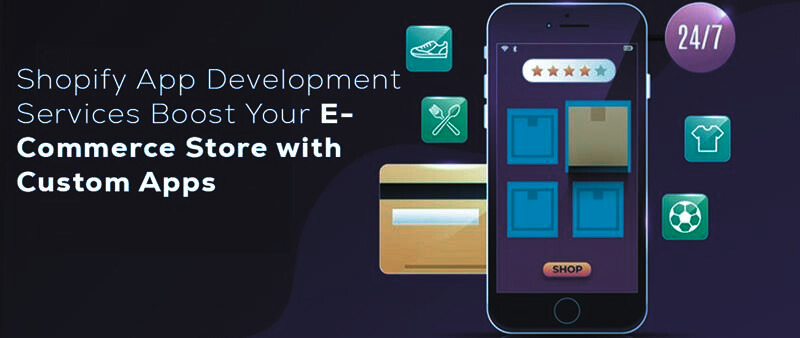Shopify has become one of the most powerful e-commerce platforms, enabling businesses of all sizes to set up and manage online stores with ease. However, every business has different requirements, which Shopify’s core features may not entirely meet. This is where Shopify app development services come in—offering customized solutions that enhance store functionality, streamline operations, and improve customer experience.
In this guide, we will explore everything you need to know about Shopify app development, including its benefits, the development process, key features, challenges, and future trends.
Understanding Shopify App Development
What is Shopify App Development?
Shopify app development refers to the process of creating applications that integrate with Shopify stores to extend their functionalities. These apps can be used to optimize checkout processes, manage inventory, improve marketing efforts, and more.
Types of Shopify Apps
There are three main types of Shopify apps:
- Public Apps – Available on the Shopify App Store and can be used by multiple merchants.
- Private Apps – Designed for a single store and not listed on the Shopify App Store.
- Custom Apps – Built specifically for a business to meet its unique requirements.
Why Your E-Commerce Store Needs Custom Shopify Apps
Limitations of Default Shopify Features
While Shopify provides an excellent range of built-in features, they may not always cover specialized business needs such as:
- Advanced order tracking
- Custom discount rules
- Personalized product recommendations
Benefits of Custom Shopify Apps
Custom Shopify apps allow businesses to:
- Enhance user experience with tailored shopping experiences.
- Automate processes to save time and effort.
- Increase conversions by optimizing the checkout flow.
- Integrate third-party tools like CRM, ERP, and marketing platforms.
Case Studies: Real-World Impact
Example 1: A fashion retailer implemented a custom AI-powered recommendation engine, leading to a 30% increase in sales.
Example 2: A subscription-based business automated its recurring billing system, reducing manual workload by 60%.
Key Features of a Well-Shopify App Development Services
A high-quality Shopify app should have:
- User-friendly Interface – Easy navigation and accessibility.
- Scalability – Ability to handle growing traffic and users.
- Mobile Responsiveness – Seamless experience across devices.
- API Integration – Connectivity with external platforms.
- Security Measures – Data encryption and secure transactions.
The Shopify App Development Process
Analysis of Needs
- Define business goals and objectives.
- Identify gaps in existing functionality.
Wireframing & Planning
- Develop blueprints and design mockups.
- Define user flow and app architecture.
Integration of Development and API
- Choose the Arthtech supports services (e.g., React, Node.js, Ruby on Rails).
- Code and integrate with Shopify APIs.
Quality Assurance & Testing
- Conduct performance and security tests.
- Identify and fix bugs before deployment.
Support Following Launch and Deployment
- Publish the app on the Shopify App Store or private store.
- Provide ongoing maintenance and updates.
Choosing the Right Shopify App Development Services Partner
Factors to Consider
- Experience & Expertise – Look for a team with proven experience in Shopify development.
- Portfolio & Reviews – Check past projects and client testimonials.
- Pricing & Support – Ensure transparency in pricing and post-launch support services.
Cost of Shopify App Development Services
Factors Affecting Costs
- Complexity – Simple apps cost less, while feature-rich apps require higher investment.
- Development Time – Custom solutions take longer to develop, impacting costs.
- Third-Party Integrations – Adding APIs increases expenses.
Cost Comparison
| Type of App | Estimated Cost Range |
| Simple Private App | $2,000 – $5,000 |
| Mid-Level Custom App | $5,000 – $15,000 |
| Advanced Public App | $15,000 – $50,000+ |
Best Practices for Shopify App Development
- Keep the UI/UX intuitive for users.
- Optimize for fast loading speeds.
- Follow Shopify’s design and security guidelines.
- Ensure mobile-first compatibility.
Common Challenges in Shopify App Development & Solutions
1. Shopify API Limitations
Solution: Work within API rate limits and optimize API calls efficiently.
2. Handling High Traffic Loads
Solution: Use scalable cloud hosting solutions like AWS and Google Cloud.
3. Ensuring App Security
Solution: Implement encryption and secure authentication methods.
4. Compatibility Issues with Shopify Themes
Solution: Test extensively across different themes before deployment.
Future Trends in Shopify App Development
1. AI and Automation
AI-driven chatbots and recommendation engines will enhance user engagement.
2. Augmented Reality (AR) & Virtual Reality (VR)
AR features will enable virtual product try-ons for better customer experiences.
3. Headless Commerce
More businesses will adopt headless Shopify setups for greater flexibility.
4. Blockchain for Secure Payments
Blockchain will improve transaction security and transparency.
Conclusion
Investing in Shopify app development services can transform your e-commerce store by offering enhanced features, streamlined operations, and improved customer engagement. Whether you need a simple automation tool or a full-fledged custom application, hiring expert developers can ensure your business stays ahead of the competition.
Looking to build a custom Shopify app? Get in touch with professional Shopify developers today!

